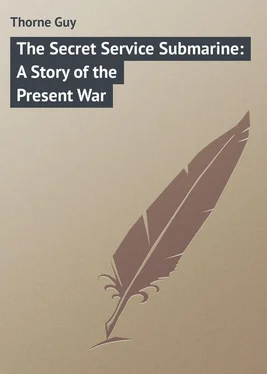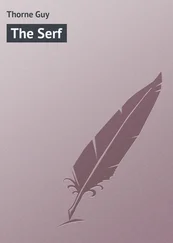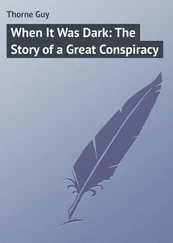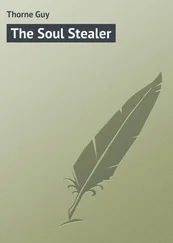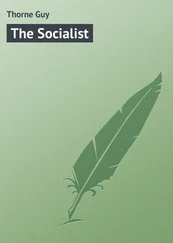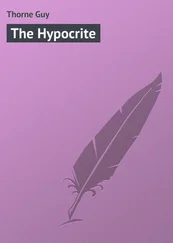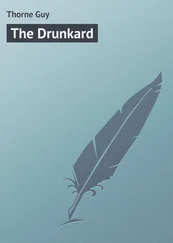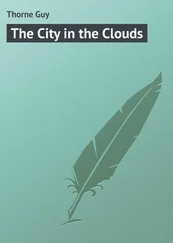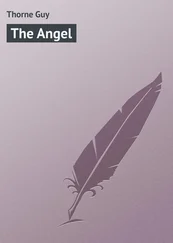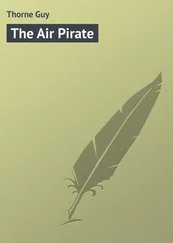Guy Thorne - The Secret Service Submarine - A Story of the Present War
Здесь есть возможность читать онлайн «Guy Thorne - The Secret Service Submarine - A Story of the Present War» — ознакомительный отрывок электронной книги совершенно бесплатно, а после прочтения отрывка купить полную версию. В некоторых случаях можно слушать аудио, скачать через торрент в формате fb2 и присутствует краткое содержание. Жанр: foreign_prose, на английском языке. Описание произведения, (предисловие) а так же отзывы посетителей доступны на портале библиотеки ЛибКат.
- Название:The Secret Service Submarine: A Story of the Present War
- Автор:
- Жанр:
- Год:неизвестен
- ISBN:нет данных
- Рейтинг книги:5 / 5. Голосов: 1
-
Избранное:Добавить в избранное
- Отзывы:
-
Ваша оценка:
- 100
- 1
- 2
- 3
- 4
- 5
The Secret Service Submarine: A Story of the Present War: краткое содержание, описание и аннотация
Предлагаем к чтению аннотацию, описание, краткое содержание или предисловие (зависит от того, что написал сам автор книги «The Secret Service Submarine: A Story of the Present War»). Если вы не нашли необходимую информацию о книге — напишите в комментариях, мы постараемся отыскать её.
The Secret Service Submarine: A Story of the Present War — читать онлайн ознакомительный отрывок
Ниже представлен текст книги, разбитый по страницам. Система сохранения места последней прочитанной страницы, позволяет с удобством читать онлайн бесплатно книгу «The Secret Service Submarine: A Story of the Present War», без необходимости каждый раз заново искать на чём Вы остановились. Поставьте закладку, и сможете в любой момент перейти на страницу, на которой закончили чтение.
Интервал:
Закладка:
To say that Doris and Marjorie hated their stepfather would be to put it with extreme mildness. They were both young and high-spirited girls, and they would have left him like a shot had it not been for some promise extorted from them by their dying mother, which they felt bound to observe. This was Mrs. Joyce's only bequest to her daughters, and, like most promises given to a semi-conscious person probably quite unaware of what she is saying, about as cruel and immoral a thing as ever bound quixotic inexperience.
Old Upjelly was a tyrant. He did not interfere in the affairs of the school much – that was to his daughters' and the masters' gain, to say nothing of the wretched boys. But the girls were forced to lead a semi-monastic life. They were not allowed to accept invitations to tennis parties at local rectories, or even to play duets at the nasty little schoolroom concerts which were always being got up by fussy parsons' wives. And most of all, they were not allowed to have anything to do with the assistant masters.
Now, as both Doris and Marjorie, of whom I naturally saw a great deal, confided to me, they had never wished to have anything to do with the assistant masters until my arrival. This did not make me vain, in view of my two other colleagues and of some who had preceded me and of whom I had heard.
The first master, who lived in a cottage in the village with a wife as senile and decrepit as himself, was the Reverend Albert Pugmire. In dim and distant days, he had held various curacies, from which he had been politely requested to retire owing to a somewhat excessive fondness for Old Tom Gin. I understand there had never been any actual inhibition on the part of a justly outraged bishop, but Mr. Pugmire, at any rate, had become chief drudge to Doctor Upjelly.
Pugmire was about sixty-two. In appearance he was exactly like one of those tapers with which one lights the gas, thin, white, ghostly, except for one vivid splash of colour, a nose resembling nothing so much as a piece of coral, which he averred was the result of indigestion. He really was a classical scholar of remarkable attainments. He would even teach a boy who wanted to learn, and once, when the son of a local clergyman with a taste for the classics wormed his way into the horrid old man's confidence, I remember with what a thunderclap of amazement it came upon us all when this young Philips gained an open scholarship at Magdalen. The event was so unprecedented that I saw Doctor Upjelly at a loss for the first time in his life. He did not know what to say, and that night old Pugmire had to be carried home. The affair, however, soon sank into oblivion and was never mentioned.
The second master, who taught such mathematics as each imp condescended to learn, was poor little Lockhart, a misshapen bundle of bones, as hollow and bitter as a dried lemon. When a baby, his nurse, during a heated altercation with the cook, had thrown him at the latter lady, and the poor chap had never known any happiness since. He had an income of his own of about a hundred a year and was able enough in his way, but he was too acid for ordinary intercourse – though, as will presently appear, he had unsuspected qualities.
Then I came, the ex-Blue with the game leg.
Having said so much, it will be fairly obvious that the second consolation I have mentioned in my life was Doris.
The Great War broke out and, in common with every other decent Englishman of my own age, I heard the call of the country. I am not going to sentimentalise about this – there is no necessity – but, of course, I was keen as mustard to go.
I was exactly six feet high; my eyesight was far above the average – the man who does most of his shooting at twilight, by moonlight, or in early dawn and at long ranges, has far keener sight than most men. My teeth were so good that I could eat Upjelly's mutton with ease, if not with satisfaction. As far as personal strength went, I was as strong as a bull – indeed, if the music halls had remained in their pristine simplicity and had not been given over to the elaborate spectacle, I could have earned a living as a weight-lifter in a leopard skin and pink tights; but, and here was the thing that made me lie awake at night grinding my teeth and cursing fate – not knowing what she had in store for me – there was my leg.
Now, I could walk and outwalk most men I knew on the marshes, the most difficult form of progression probably known to man, as anyone who has tramped the thick, black mud and the marrum grass well knows. No professional wild-fowler from Stiffkey or Cockthorpe could outdo me. Yet, when I went to Norwich and offered myself for the East Norfolk Territorial Battalion, a fool of a doctor in goggles, with whom I wouldn't have cleaned my ten-bore, rejected me at once, despite all I could say or do – and, what is more, told me that I would have no possible chance elsewhere. I told him what I thought of him, and nearly cried. Then I went out into an adjacent pub, had some beer, and cursed bitterly, until the recruiting sergeant whom I had first interviewed, likewise in search of beer, happened to come into the private bar. He was a decent sort of johnny and told me a few eye-opening things about doctors. He said that he would be proud to have me in his company, and he gave me an invaluable tip. Finding out that I knew something about engineering, he suggested that I should go to London and try and get into the Royal Naval Flying Corps. At that time, the great fleet of armoured motor cars was being got ready. I could drive a car with any man and I was a fairly good motor mechanic.
My brother, Bernard, was, as I said, in the Navy. He was, by this time, Lieutenant-Commander in the submarine section, and he was in London, having been shot in the arm during a little scrap off Heligoland.
I got leave from old Upjelly, who, for some queer reason or other, did not seem to take to the idea of my enlisting – though, heaven knows, he had never shown any appreciation of my services – and went up to town. I found Bernard just out of hospital. He had to rest for another month, and, as he had hardly any money beyond his pay and special allowances, he wanted to do it on the cheap. I suggested that he should come down to Morstone and stay in the village pub. He was as keen on shooting as I, and he hailed the idea with joy.
He took me to the then depôt of the R.N.F.C., at the big Daily Mail air-ship shed at Wormwood Scrubbs, and he used every possible bit of influence he had got to get me in.
The naval people were all awfully jolly, but regulations were strict, and though they moved heaven and earth for me, it could not be done.
I said good-bye to my brother, who was to come down to Morstone almost immediately, and one dull, bitter afternoon in the middle of December, I found myself in a third-class carriage going home – once more a hopeless failure.
I could see old Upjelly's mocking sneer, I could hear little Lockhart's titter; old Pugmire would say, "A gin and soda is clearly indicated in this crisis." And Doris – what would Doris say?
Well, Doris, poor Doris, would weep. She would know it was not my fault, dear little girl, but she would weep. And for many days I should read my newspaper, which arrived in the evening, over the fire in my sitting-room in the north wing at the end of the dormitory, and if I did not weep too, it would be because I was a man and not a girl. Other people would be doing glorious things. Two-thirds of the men of my own college were already either at the front or in training. Some smug, who could not get into the second fifteen at Exeter, would become D.S.O. or V.C. Morstone would be full of farm lads, who had gone out louts and come back wounded heroes. And for me, only what some priggish hymn or other describes as "the daily round, the common task," how damnably common, only I myself knew.
Читать дальшеИнтервал:
Закладка:
Похожие книги на «The Secret Service Submarine: A Story of the Present War»
Представляем Вашему вниманию похожие книги на «The Secret Service Submarine: A Story of the Present War» списком для выбора. Мы отобрали схожую по названию и смыслу литературу в надежде предоставить читателям больше вариантов отыскать новые, интересные, ещё непрочитанные произведения.
Обсуждение, отзывы о книге «The Secret Service Submarine: A Story of the Present War» и просто собственные мнения читателей. Оставьте ваши комментарии, напишите, что Вы думаете о произведении, его смысле или главных героях. Укажите что конкретно понравилось, а что нет, и почему Вы так считаете.
